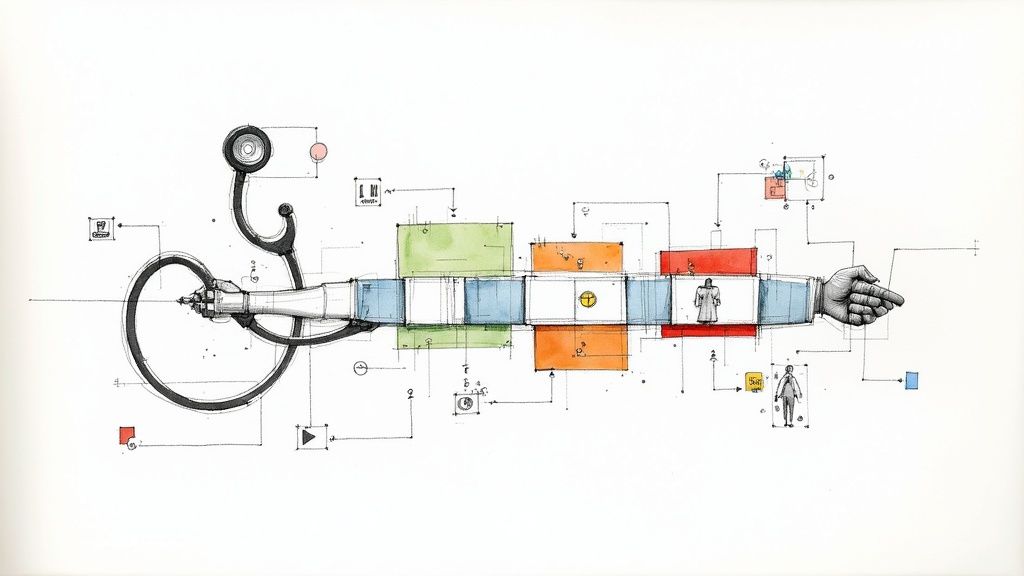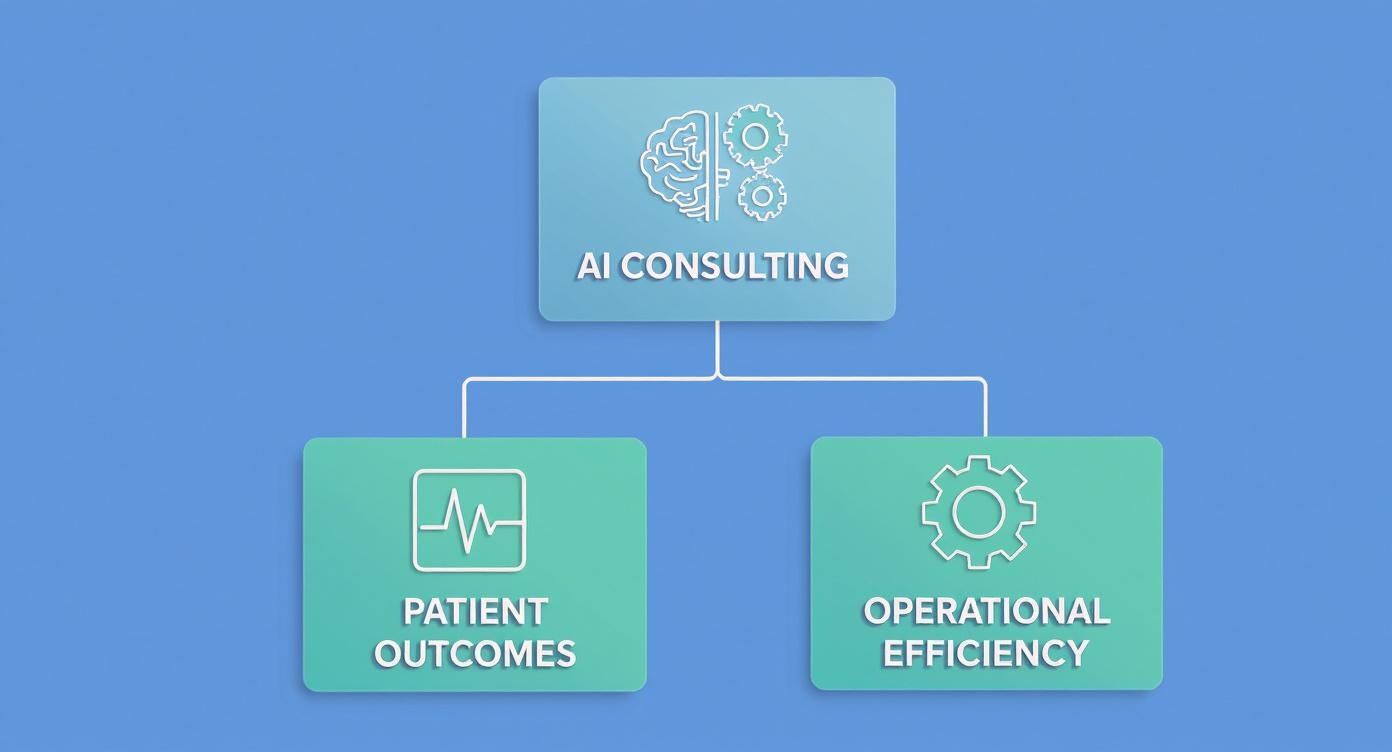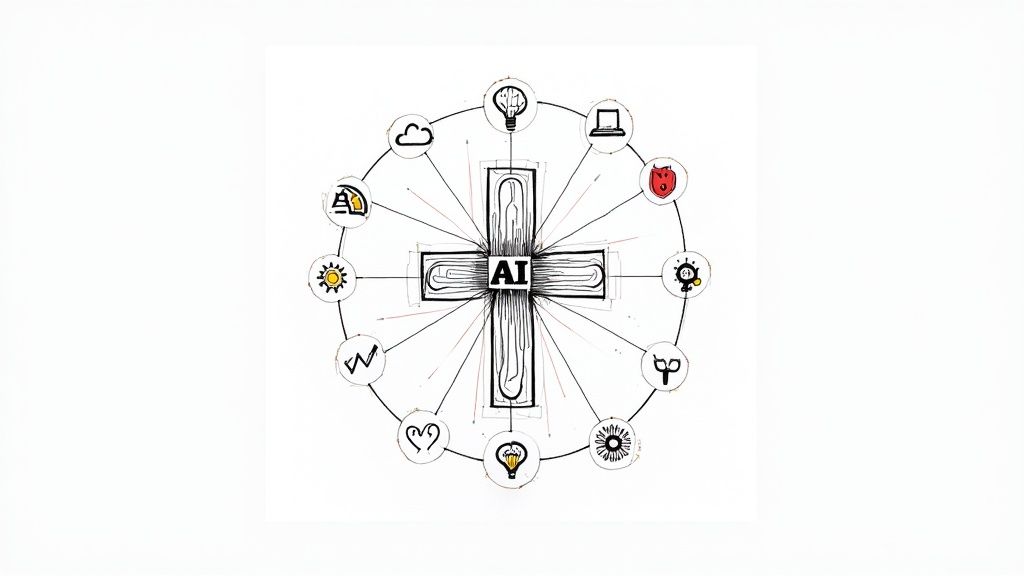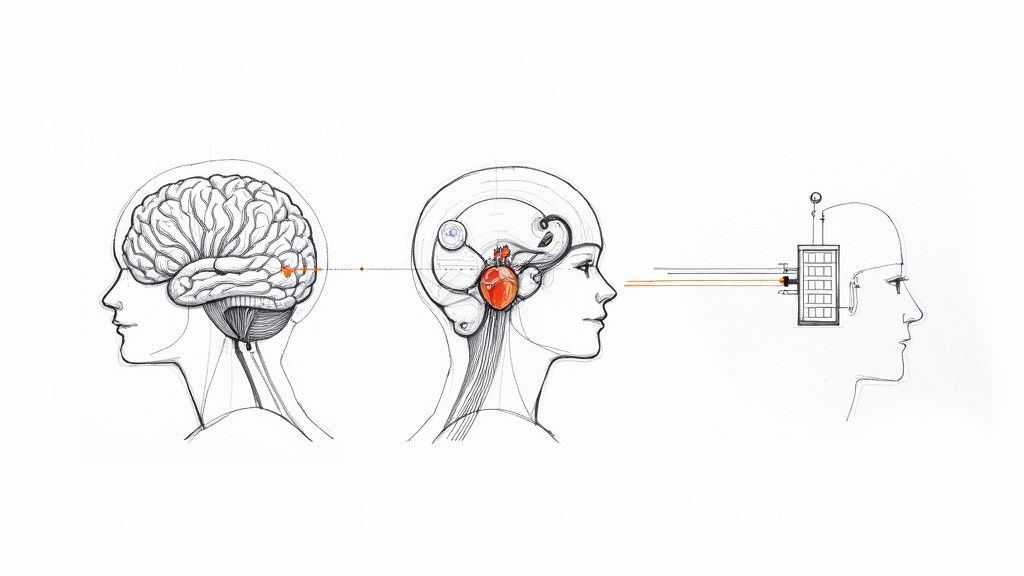Healthcare AI Consulting Guide to Better Patient Care
Discover how healthcare AI consulting transforms diagnostics, operations, and patient outcomes. Learn to navigate AI adoption with expert guidance.

So, what exactly is healthcare AI consulting?
Think of it as the bridge connecting the brilliant, complex world of artificial intelligence with the realities of patient care. It’s about bringing in experts who can help a hospital or clinic pinpoint its biggest challenges, map out a smart AI strategy, and navigate the tricky parts of implementation. At its core, it's about making sure that AI solutions actually solve real problems to improve how patients are treated and how the organization runs.
Why Healthcare Is Turning to AI Consulting
Let's be honest—the healthcare industry is under immense pressure. We're seeing a perfect storm of rising operational costs, frustrating diagnostic delays, and clinical staff stretched to their breaking point. At the same time, patients are demanding better, more personalized care. This is the moment where AI shifts from a futuristic buzzword to a must-have strategic tool.
But getting started with AI isn't like installing new software on your laptop. It demands a serious understanding of clinical workflows, strict data privacy laws like HIPAA, and the nitty-gritty of integrating new tech with old systems. This is precisely why so many healthcare leaders are now looking for healthcare AI consulting.
Bridging the Technology and Clinical Divide
The best AI consultants are translators. They speak both the language of data science and the language of patient care, helping organizations sift through the hype to find AI applications that can make a genuine difference. Instead of just buying the latest shiny tech, a consultant helps you build a solid business case for AI that lines up with what your organization actually needs to achieve.
This kind of strategic guidance makes sure that every AI project is aimed at delivering real, measurable results. Things like:
- Improving Diagnostic Accuracy: Giving radiologists a second set of AI-powered eyes to catch diseases earlier and more accurately.
- Streamlining Administrative Tasks: Automating the tedious, repetitive back-office work so staff can spend more time with patients.
- Personalizing Patient Treatment: Using data to forecast health risks and create treatment plans that are truly tailored to the individual.
The momentum here is incredible. The global AI in healthcare market is expected to jump from USD 21.66 billion in 2025 to a staggering USD 110.61 billion by 2030. That growth is being fueled by the exact needs we're talking about. As more organizations try to get in on this, expert AI strategy consulting becomes the key to managing the complexity and getting a strong return on investment.
Ultimately, this partnership turns what could be a risky tech gamble into a well-managed, strategic move. As we've covered in our overview of AI applications in healthcare, the end goal is always the same: to get to a place of safer, more efficient, and data-driven patient care, faster.
Understanding Core AI Consulting Services
When a healthcare organization starts thinking about artificial intelligence, the first question is usually the most basic: What does a healthcare AI consultant actually do? It’s not about just buying a piece of software. It’s about partnering with an expert who can guide you on a structured path, from that initial spark of an idea all the way to a measurable impact on your clinical and operational results.
These engagements are built around a few core, value-driven services designed to take the risk out of the investment and get you the best possible outcome.
The journey almost always starts with an AI readiness assessment. You can think of this as a complete diagnostic check-up for your organization. A consultant will take a deep dive into your current state, looking at everything from your data infrastructure and security protocols to the digital skills of your clinical staff. They’re there to identify strengths, weaknesses, and any potential roadblocks before a single line of code is written. It’s all about making sure you’re building on solid ground.
This initial analysis is absolutely critical. A hospital might be sitting on mountains of patient data, but if it's all trapped in disconnected, old-school systems, it’s simply not ready for advanced AI. The readiness assessment gives you a clear, honest picture of what needs to be fixed first.
The infographic below shows how these consulting services branch out to improve the two primary areas of any healthcare system.

As you can see, expert consulting is the strategic heart, directly powering real advancements in both patient outcomes and the efficiency of your day-to-day operations.
From Assessment to Actionable Strategy
Once everyone has a clear understanding of your organization’s readiness, the work moves into strategic roadmap development. This is where a consultant helps you pinpoint and prioritize the AI projects that will make the biggest difference for your specific needs. Instead of just chasing the latest trends, the focus is on solving your most pressing problems—whether that’s cutting down patient wait times, boosting diagnostic accuracy, or automating tedious administrative work.
This roadmap is much more than a simple list of ideas. It’s a detailed blueprint that covers:
- Use Case Prioritization: Figuring out which projects will deliver the best ROI, both financially and clinically.
- Data Governance Planning: Building a solid framework to manage data responsibly and ensure you’re meeting strict HIPAA compliance.
- Vendor Selection Guidance: Helping you navigate the market and choose the right technology partners whose tools actually fit your goals.
- Change Management Strategy: Creating a plan to make sure your clinical and administrative staff understand, trust, and ultimately adopt the new AI-powered workflows.
Navigating the Market and Ensuring Success
The demand for this kind of specialized advice is growing fast. The broader healthcare consulting market is already huge—projected to hit USD 52 billion by 2033—but the niche focused specifically on AI is expanding at an even quicker pace. This boom is being driven by the unique challenges in healthcare, like managing massive, highly sensitive datasets while navigating an incredibly complex regulatory maze.
One of the most crucial services—and one that’s often overlooked—is long-term implementation and support. A good consultant doesn't just hand you a plan and wish you luck. They stick around, guiding the project through its entire lifecycle. This ongoing partnership is essential for troubleshooting technical hiccups, fine-tuning the AI models as new data comes in, and adjusting the strategy as your organization's priorities change. You can see what that process looks like by exploring a detailed AI Product Development Workflow.
In the end, all these core services fit together to create a single, cohesive program. They take the abstract idea of "AI" and turn it into a concrete, manageable, and successful initiative that delivers real, lasting value for both your patients and your providers.
Diving into High-Impact AI Use Cases in Healthcare
Once you've got a solid AI strategy in place, the real excitement begins when you see how those plans come to life. This is where the value of healthcare AI consulting really shines—watching technology solve tangible, everyday problems for both clinicians and patients. AI isn't some far-off concept anymore; it's actively reshaping how care is delivered and how facilities are run, right now.
You can generally split these applications into two main buckets: those directly affecting clinical work and patient outcomes, and those that smooth out the complex operations humming along in the background. Both are critical for building a healthcare system that's more efficient, effective, and truly centered around the patient.
Sharpening Clinical Precision and Boosting Patient Outcomes
On the clinical side, think of AI as an incredibly powerful assistant. It’s not here to replace doctors, but to supercharge their skills by giving them deeper insights pulled from massive amounts of data.
A great example that’s already well-established is medical imaging analysis. AI algorithms, which have learned from millions of X-rays, CT scans, and MRIs, can spot tiny patterns that the human eye might overlook. In fact, studies show AI can improve breast cancer detection by as much as 20%. That means earlier diagnoses and, ultimately, better outcomes for patients.
Then there's predictive analytics for disease prevention. By sifting through electronic health records (EHRs), genetic data, and public health information, AI models can flag individuals at high risk for conditions like sepsis or heart failure long before they show any symptoms. We're even seeing this in consumer tech, like the Apple Watch for AFib detection, where AI can add another layer of accuracy.
"By flagging high-risk patients, AI allows healthcare providers to shift from reactive treatment to proactive intervention. This not only improves patient outcomes but also significantly reduces long-term healthcare costs associated with chronic disease management."
Finally, AI is turning the promise of personalized medicine into a reality. Instead of a one-size-fits-all approach, algorithms can analyze a patient's unique genetic profile and lifestyle to recommend the most effective treatments. This has been a game-changer in oncology, helping doctors choose targeted therapies that pack a bigger punch with fewer side effects.
Streamlining Healthcare Operations for Peak Efficiency
While the clinical breakthroughs get most of the attention, what AI is doing for hospital operations is just as profound. Healthcare organizations are complex beasts, and even small gains in efficiency can translate into huge cost savings and happier patients.
Here are a few ways AI is making a difference behind the scenes:
- Automated Claims Processing: Forget manual reviews. AI can process insurance claims automatically, catching errors and flagging inconsistencies in a fraction of the time. One organization was able to recover $1.14 million in lost revenue just by tackling these costly human errors.
- Optimized Patient Scheduling: Smart scheduling tools can predict no-shows, find the best appointment slots, and manage clinic resources to cut down on frustrating wait times. An AI tool like the Ekipa Clinic AI Assistant (https://www.ekipa.ai/products/clinic-ai-assistant) helps manage the entire patient flow, letting staff focus on people instead of paperwork.
- Smarter Supply Chain Management: AI can help hospitals forecast demand for critical supplies, from medications to PPE. This predictive power prevents stockouts during a crisis and cuts down on waste from over-ordering, making sure resources are always there when they’re needed most.
Navigating Data Ethics and Regulatory Hurdles
Jumping into healthcare AI isn't just about the technology; it's a walk across an ethical and regulatory tightrope. The very data that fuels these smart systems is some of the most personal, sensitive information out there. That puts a huge weight of responsibility on any organization to safeguard patient privacy, ensure the AI is fair, and maintain trust with every new tool they roll out.
Getting this right means being proactive, not just reacting when something goes wrong. A good healthcare AI consulting partner is your guide through this maze, helping you build a solid data governance plan from the very beginning. This isn't just about dodging fines—it's about creating an AI program that's built to last and do the right thing.

Upholding Strict Regulatory Compliance
In the United States, the big one is the Health Insurance Portability and Accountability Act (HIPAA). It’s the gold standard for protecting patient health information. Any AI application you build has to have HIPAA compliance baked into its DNA, meaning all data must be securely stored, sent, and only seen by people who are supposed to see it.
But the rulebook doesn't end there. Depending on what your AI does, you might also have to follow the FDA's rules for Software as a Medical Device (SaMD). To get a strong handle on all this, many healthcare organizations find it useful to work with expert ISO 27001 consulting services to navigate these complex frameworks. This kind of specialized help is crucial for managing risk, no matter if you're developing secure internal tooling or launching a full-scale custom healthcare software development project.
Confronting the Challenge of Algorithmic Bias
One of the biggest ethical landmines in healthcare AI is algorithmic bias. Think about it: if an AI model learns from data that mostly comes from one demographic, its insights and predictions for other groups might be way off. This can accidentally make existing health inequalities even worse—a disastrous outcome for any provider.
Imagine a diagnostic AI trained mostly on data from male patients. It might struggle to spot heart disease in female patients, whose symptoms can look very different. This isn't intentional, but it's a dangerous blind spot caused by unbalanced data.
Fixing this takes real, conscious effort. Consultants can help you audit your datasets and models for bias, put fairness metrics in place, and make sure your AI systems are thoroughly tested on diverse patient groups before they go live. Ethical oversight is a constant commitment, not a one-and-done checkbox.
Building Trust Through Explainable AI
For doctors and nurses to actually use and rely on AI-powered suggestions, they need to know how the AI came to its conclusions. This is the whole idea behind Explainable AI (XAI). A "black box" algorithm that just spits out an answer with no reasoning simply won't fly when a patient's health is on the line.
XAI techniques peel back the curtain on the model's thought process, letting clinicians see the factors that led to a specific prediction. This transparency builds confidence and helps them see AI as a helpful partner, not some mysterious oracle they have to blindly obey.
The demand for this kind of guidance is clear. The global AI consulting services market is set to skyrocket, growing from USD 11.07 billion in 2025 to an estimated USD 90.99 billion by 2035. In healthcare, these services are essential for tackling the tricky issues of data governance, bias, and compliance, making sure AI is used safely and for the good of all patients.
How to Choose the Right AI Consulting Partner
Picking the right partner is probably the most important decision you'll make on your entire AI journey. A great consultant is a force multiplier—they speed up your progress and help you dodge expensive mistakes. On the flip side, a partner who isn't the right fit can drain your budget, stall projects, and kill your organization's belief in what AI can do.
You're looking for a true partner, not just another vendor. The goal is to find someone who feels like a natural extension of your own team. This means you have to go way beyond their slick capabilities presentation and really dig into their experience, their process, and how well they'll fit with your culture.
Look for Deep Healthcare Domain Expertise
This one is non-negotiable. It's the absolute number one requirement. A consultant who can talk all day about machine learning but doesn't understand clinical workflows is a liability, plain and simple.
Genuine healthcare AI consulting requires a partner who speaks the same language as your doctors, nurses, and administrators. They have to get the messy realities of patient care, the constant pressure of the revenue cycle, and the critical importance of staying compliant.
Don't be shy. Ask them direct questions about their hands-on experience with:
- Clinical Workflows: How have they actually woven AI into clinical processes without getting in the way of patient care? Ask for specifics.
- Data Interoperability: Can they prove they've connected clunky, separate data sources like EHRs, PACS, and billing systems?
- Regulatory Frameworks: What’s their track record with building HIPAA-compliant AI and handling data governance?
A team that only talks algorithms but can't discuss the clinical context is going to have a hard time delivering anything useful. The best partners are usually a mix of data scientists, healthcare strategists, and even clinicians who truly understand both sides of the coin.
Scrutinize Their Portfolio and Methodology
A solid track record is the best crystal ball you have. Don't just settle for a slide with a bunch of company logos. Ask for detailed case studies and real-world use cases that actually look like what you're trying to achieve.
When you're looking at their past work, zero in on the results. Did they actually reduce diagnostic errors? Did they cut administrative costs or make the hospital run more efficiently? The "what" matters more than the "how."
Their process is just as important. A structured, transparent methodology is a huge sign of a mature consulting firm. Look for partners that have a clear AI Product Development Workflow that shows you exactly how they get from an idea to a deployed solution. Tools like an AI Strategy consulting tool or an AI requirements analysis generator show they're committed to a methodical, disciplined approach.
Key Takeaway: A consultant’s real value isn’t just the AI model they build at the end. It's the strategic clarity, risk management, and operational discipline they bring to the whole project. Their process should be just as impressive as their tech.
Ask the Tough Questions About Long-Term Success
Your relationship with an AI consultant shouldn't just stop the day a new system goes live. AI isn't something you can set and forget. Models drift, data changes, and they need to be monitored, retrained, and tweaked over time. You need a partner who's in it for the long haul.
During the vetting process, make sure you ask these questions:
- How do you measure success? A good partner will work with you to set clear, measurable KPIs right from the start.
- What does long-term support look like? Get into the details about their plans for ongoing model maintenance, performance monitoring, and user training.
- How do you handle change management? A great consultant knows the tech is only half the battle. They'll help you prepare your staff for new ways of working to make sure people actually use the new tools.
- What is your approach to upskilling our team? The ideal partner doesn't want you to be dependent on them forever. They empower your own people, building your organization's AI muscles for the future.
In the end, it all comes down to finding a team with the right mix of technical chops, industry knowledge, and a collaborative spirit. They should be just as invested in improving patient outcomes as you are. To get a better feel for our own philosophy, we encourage you to get to know our expert team.
What's Your Next Move in AI-Powered Healthcare?
We've covered a lot of ground, and one thing should be crystal clear: AI isn't just another piece of tech. It’s a fundamental shift in how healthcare operates, and getting it right requires a smart approach. The opportunity to improve patient outcomes, give clinicians their time back, and make operations run smoothly is massive, but you can't just stumble into it. You need a plan.
So, where do you begin?
Your journey starts right now. The single most important first step is to take an honest look at where your organization stands and pinpoint one or two pressing problems that AI could realistically solve. As we explored in our AI adoption guide, this sharp focus helps you avoid getting overwhelmed and lets you score an early win that builds momentum.
Don't Go It Alone—Find Your Guide
Embarking on this journey without a map is a recipe for disaster. This is where partnering with a team that gets both the technology and the mission of healthcare makes all the difference. Think of healthcare AI consulting as the GPS that helps you navigate around common pitfalls and gets you to your destination—measurable results—much faster.
Working with seasoned AI strategy consulting experts helps you build a strong foundation for whatever comes next. The right partner can guide you through everything, from the initial discovery phase with an AI requirements analysis to architecting a complete strategy for powerful internal tooling.
Key Takeaway: Remember, the real goal isn't just plugging in new software. It's about building a culture where data-driven decisions become second nature, constantly improving how you care for patients and run your organization. That takes a mix of technical know-how and strategic vision.
Ready to see what’s possible? Take a look at our suite of AI tools for business.
And when you're ready to start a real conversation about your organization's future, our expert team is here to listen.
Frequently Asked Questions About Healthcare AI Consulting
Thinking about bringing in an AI consultant? It’s natural to have questions about the practical side of things—cost, timelines, and what you’ll need to have in place internally. Let's tackle some of the most common ones we hear.
What Is the Typical ROI on a Healthcare AI Project?
This is the big question, and the honest answer is: it depends. The return on investment for a healthcare AI project really hinges on what you’re trying to achieve.
For operational improvements, like automating the mess of claims processing, the ROI is usually straightforward. You can often see clear cost savings and efficiency boosts within 12–18 months as manual work and errors decrease.
Clinical applications are a different story. If you're using AI to improve diagnostic accuracy, the ROI isn't just a number on a spreadsheet. It’s measured in better long-term patient outcomes, fewer readmissions, and a stronger reputation. A good consulting partner will help you map this out from day one, defining clear KPIs to track both the financial and clinical wins.
How Long Does a Typical Consulting Engagement Last?
The timeline is all about the scope. If you're just looking for a strategic roadmap or an assessment to see if you're even ready for AI, that can be a focused sprint of about 4 to 8 weeks.
A pilot project to test out a specific idea—say, predicting patient no-shows for a single department—might take anywhere from 3 to 6 months. But if you’re looking at a full-scale, enterprise-wide rollout, you should be prepared for a longer partnership that could easily span a year or more. Most good firms are flexible and can offer anything from short-term advice to ongoing support through models like AI Automation as a Service.
Do We Need an In-House Data Science Team?
Not necessarily. In fact, bridging that exact skills gap is one of the main reasons organizations hire an AI consulting firm in the first place. You don't need a full team of PhDs on standby.
Having some technical folks on your team is definitely a plus, but the consultants are the ones who bring the specialized data science, engineering, and strategic know-how to the table. A huge part of their job is actually to upskill your own people along the way, building up your internal muscle for the long run. They’re there to augment your team, not replace it. Kicking things off with an AI requirements analysis can help pinpoint exactly who and what you'll really need.
How Do Consultants Ensure Patient Data Security?
This is non-negotiable. Patient data security has to be the top priority, and any consultant worth their salt knows it. Reputable firms live and breathe HIPAA compliance and operate under incredibly strict data governance protocols.
Here’s what that looks like in practice:
- They’ll use de-identified or anonymized data for training models whenever possible.
- Everything is locked down with robust access controls and encryption.
- They work within secure cloud environments designed for sensitive data.
- They will always sign a Business Associate Agreement (BAA) to legally formalize their responsibilities.
Your consultant should work hand-in-glove with your own IT and compliance teams to make sure every single step, from data ingestion to model deployment, is airtight.
Ready to see how AI can reshape your healthcare strategy? At Ekipa AI, we help you turn ideas into real-world impact. Start by building your Custom AI Strategy report today, or get to know our expert team to discuss your unique needs.



